71 have author last names that start with L have author last names that start with L

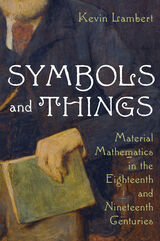
In the steam-powered mechanical age of the eighteenth and nineteenth centuries, the work of late Georgian and early Victorian mathematicians depended on far more than the properties of number. British mathematicians came to rely on industrialized paper and pen manufacture, railways and mail, and the print industries of the book, disciplinary journal, magazine, and newspaper. Though not always physically present with one another, the characters central to this book—from George Green to William Rowan Hamilton—relied heavily on communication technologies as they developed their theories in consort with colleagues. The letters they exchanged, together with the equations, diagrams, tables, or pictures that filled their manuscripts and publications, were all tangible traces of abstract ideas that extended mathematicians into their social and material environment. Each chapter of this book explores a thing, or assembling of things, mathematicians needed to do their work—whether a textbook, museum, journal, library, diagram, notebook, or letter—all characteristic of the mid-nineteenth-century British taskscape, but also representative of great change to a discipline brought about by an industrialized world in motion.

Sometimes the most compelling landscapes are the ones where worlds collide: where a desert meets the sea, a civilization, no-man’s land. Here in Bonfire Opera, grief and Eros grapple in the same domain. A bullet-hole through the heart, a house full of ripe persimmons, a ghost in a garden. Coyotes cry out on the hill, and lovers find themselves kissing, “bee-stung, drunk” in the middle of road. Here, the dust is holy, as is the dark, unknown. These are poems that praise the impossible, wild world, finding beauty in its wake.
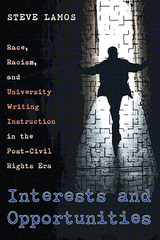
In the late 1960s, colleges and universities became deeply embroiled in issues of racial equality. To combat this, hundreds of new programs were introduced to address the needs of “high-risk” minority and low-income students. In the years since, university policies have flip-flopped between calls to address minority needs and arguments to maintain “Standard English.” Today, anti-affirmative action and anti-access sentiments have put many of these high-risk programs at risk.
In Interests and Opportunities, Steve Lamos chronicles debates over high-risk writing programs on the national level, and locally, at the University of Illinois at Urbana-Champaign. Using critical race theorist Derrick Bell’s concept of “interest convergence,” Lamos shows that these programs were promoted or derailed according to how and when they fit the interests of underrepresented minorities and mainstream whites (administrators and academics). He relates struggles over curriculum, pedagogy, and budget, and views their impact on policy changes and course offerings.
Lamos finds that during periods of convergence, disciplinary and institutional changes do occur, albeit to suit mainstream standards. In divergent times, changes are thwarted or undone, often using the same standards. To Lamos, understanding the past dynamics of convergence and divergence is key to formulating new strategies of local action and “story-changing” that can preserve and expand race-consciousness and high-risk writing instruction, even in adverse political climates.
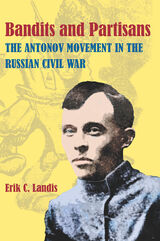
Landis examines both sides of the conflict, probing the testimonies of the insurgents, their opponents, and those caught in between. We witness firsthand the frustrations, failures, and internal conflicts of the Bolsheviks and the spirit of rebellion that drove the insurgents and helped drive a localized dispute into a well-organized mass rebellion that struck fear in the hearts of Communist leaders. This political and military threat was influential in bringing about Lenin's conciliatory New Economic Policy, which allowed farmers and villages to sustain themselves in a quasi-market economy.
Bandits and Partisans presents a gripping tale of brutality, domination, and revolt, placing readers at the frontlines of the complex and rich history of the Russian civil war and the consolidation of the new Soviet state.
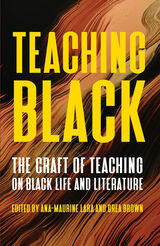
Teaching Black: The Craft of Teaching on Black Life and Literature presents the experiences and voices of Black creative writers who are also teachers. The authors in this collection engage poetry, fiction, experimental literature, playwriting, and literary criticism. They provide historical and theoretical interventions and practical advice for teachers and students of literature and craft. Contributors work in high schools, colleges, and community settings and draw from these rich contexts in their essays. This book is an invaluable tool for teachers, practitioners, change agents, and presses. Teaching Black is for any and all who are interested in incorporating Black literature and conversations on Black literary craft into their own work.

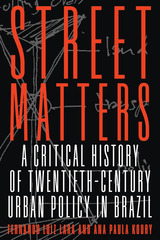
Street Matters links urban policy and planning with street protests in Brazil. It begins with the 2013 demonstrations that ostensibly began over public transportation fare increases but quickly grew to address larger questions of inequality. This inequality is physically manifested across Brazil, most visibly in its sprawling urban favelas. The authors propose an understanding of the social and spatial dynamics at play that is based on property, labor, and security. They stitch together the history of plans for urban space with the popular protests that Brazilians organized to fight for property and land. They embed the history of civil society within the history of urban planning and its institutionalization to show how urban and regional planning played a key role in the management of the social conflicts surrounding land ownership. If urban and regional planning at times benefited the expansion of civil rights, it also often worked on behalf of class exploitation, deepening spatial inequalities and conflicts embedded in different city spaces.

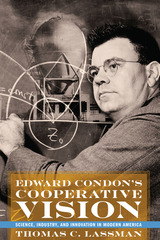
Edward Condon’s Cooperative Vision explores the life cycle of that vision during the Great Depression, the Second World War, and the early Cold War. Condon’s cooperative model of research and development evolved over time and by consequence laid bare sharp disagreements among academic, corporate, and government stakeholders about the practical value of new knowledge, where and how it should be produced, and ultimately, on whose behalf it ought to be put to use.
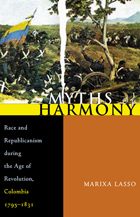
This book centers on a foundational moment for Latin American racial constructs. While most contemporary scholarship has focused the explanation for racial tolerance-or its lack-in the colonial period, Marixa Lasso argues that the key to understanding the origins of modern race relations are to be found later, in the Age of Revolution.
Lasso rejects the common assumption that subalterns were passive and alienated from Creole-led patriot movements, and instead demonstrates that during Colombia's revolution, free blacks and mulattos (pardos) actively joined and occasionally even led the cause to overthrow the Spanish colonial government. As part of their platform, patriots declared legal racial equality for all citizens, and promulgated an ideology of harmony and fraternity for Colombians of all colors. The fact that blacks were mentioned as equals in the discourse of the revolution and later served in republican government posts was a radical political departure. These factors were instrumental in constructing a powerful myth of racial equality-a myth that would fuel revolutionary activity throughout Latin America.
Thus emerged a historical paradox central to Latin American nation-building: the coexistence of the principle of racial equality with actual racism at the very inception of the republic. Ironically, the discourse of equality meant that grievances of racial discrimination were construed as unpatriotic and divisive acts-in its most extreme form, blacks were accused of preparing a race war. Lasso's work brings much-needed attention to the important role of the anticolonial struggles in shaping the nature of contemporary race relations and racial identities in Latin America.
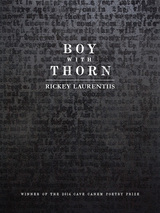
Winner of the 2014 Cave Canem Poetry Prize
Finalist for the 2017 Kate Tufts Discovery Award
Rickey Luarentiis is a winner of a 2018 Whiting Writers Prize
In a landscape at once the brutal American South as it is the brutal mind, Boy with Thorn interrogates the genesis of all poetic creation—the imagination itself, questioning what role it plays in both our fascinations with and repulsion from a national history of racial and sexual violence. The personal and political crash into one language here, gothic as it is supple, meditating on visual art and myth, to desire, the practice of lynching and Hurricane Katrina. Always at its center, though, is the poet himself—confessing a double song of pleasure and inevitable pain.
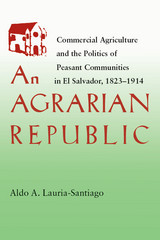
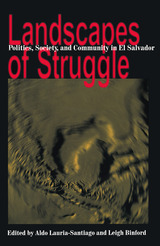
During the 1980s, El Salvador's violent civil war captured the world's attention. In the years since, the country has undergone dramatic changes. Landscapes of Struggle offers a broad, interdisciplinary assessment of El Salvador from the late nineteenth century to the present, focusing on the ways local politics have shaped the development of the nation.
Proceeding chronologically, these essays-by historians, political scientists, sociologists, and anthropologists-explore the political, social, and cultural dynamics governing the Salvadoran experience, including the crucial roles of land, the military, and ethnicity; the effects of the civil war; and recent transformations, such as the growth of a large Salvadoran diaspora in the United States. Taken together, they provide a fully realized portrait of El Salvador's troublesome past, transformative present, and uncertain future.
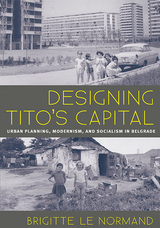
Led first by architect Nikola Dobrovic and later by Miloš Somborski, planners blended the predominant school of European modernism and the socialist principles of efficient construction and space usage to produce a model for housing, green space, and working environments for the masses. A major influence was modernist Le Corbusier and his Athens Charter published in 1943, which called for the total reconstruction of European cities, transforming them into compact and verdant vertical cities unfettered by slumlords, private interests, and traffic congestion. As Yugoslavia transitioned toward self-management and market socialism, the functionalist district of New Belgrade and its modern living were lauded as the model city of socialist man.
The glow of the utopian ideal would fade by the 1960s, when market socialism had raised expectations for living standards and the government was eager for inhabitants to finance their own housing. By 1972, a new master plan emerged under Aleksandar Ðordevic, fashioned with the assistance of American experts. Espousing current theories about systems and rational process planning and using cutting edge computer technology, the new plan left behind the dream for a functionalist Belgrade and instead focused on managing growth trends. While the public resisted aspects of the new planning approach that seemed contrary to socialist values, it embraced the idea of a decentralized city connected by mass transit.
Through extensive archival research and personal interviews with participants in the planning process, Le Normand’s comprehensive study documents the evolution of ‘New Belgrade’ and its adoption and ultimate rejection of modernist principles, while also situating it within larger continental and global contexts of politics, economics, and urban planning.
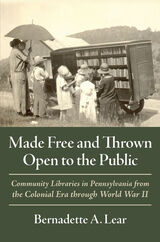
Made Free and Thrown Open to the Public charts the history of public libraries and librarianship in Pennsylvania. Based on archival research at more than fifty libraries and historical societies, it describes a long progression from private, subscription-based associations to publicly funded institutions, highlighting the dramatic period during the late nineteenth and early twentieth centuries when libraries were “thrown open” to women, children, and the poor. Made Free explains how Pennsylvania’s physical and cultural geography, legal codes, and other unique features influenced the spread and development of libraries across the state. It also highlights Pennsylvania libraries’ many contributions to the social fabric, especially during World War I, the Great Depression, and World War II. Most importantly of all, Made Free convincingly argues that Pennsylvania libraries have made their greatest strides when community activists and librarians, supported with state and local resources, have worked collaboratively.

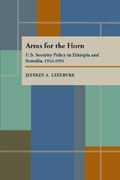
Using a great power-small power theoretical approach and advancing a supplier-recipient barganing model, Jeffery Lefebvre attempts to explain what the United States has paid for its relations with two weak and vulnerable arms recipients in the Horn of Africa.
Through massive documentation and extensive interviewing, Lefebvre sorts through the confusions and shifts of the United States’ post-World War II relations with Ethiopia and Somalia, two primary antagonists in the Horn of Africa. He consulted State Department, Pentagon, and AID officials, congressional staffers, current and former ambassadors, and Ethiopian and Somali government advisers.
The story of U.S. arms transfers to northeast Africa is tangled and complex. In 1953, 1960, and 1964-66, the United States entered into various arms provision deals with Ethiopia, spurred by the Soviet-sponsored buildup in the region. Policy changed in the 1970s: Nixon refused a large aid request in 1973, and in 1977 Carter ended Ethiopia’s military aid on human rights grounds and denied aid to Somalia during the 1977-78 Ogaden War. Reversing this policy, the Reagan administration extended military aid to Somalia despite its aggressive moves against Ethiopia. Changes in U.S. relations and the revolution in Somalia have altered the picture once more.
Jeffery Lefebvre concludes that U.S. diplomacy in northeast Africa has been overly influenced by a cold war mentality. In their obsession with countering Soviet pressure in the Third World, Washington decision makers exposed U.S. interests to unnecessary risks and given far too much for value received during four decades of vacillating and misguided foreign policy.
Arms for the Horn should interest all concerned with arms transfer issues and security studies, as well as specialist in Africa and the Middle East.

Recently, there has been a renewed concern with highway safety, reflected in wide media coverage and new laws aimed at reducing highway deaths and injuries. Legge examines three initiatives that have been studied only in isolation: stricter drinking-age laws, mandated use of seat belts, and deterrents to drunk driving. His research covers three large industrial states-New York, California, and Michigan, as well as Great Britain, each of which uses a different mix of these initiatives. Using a combination of theory and research methodology, Legge tests a number of models on how traffic fatalities might be reduced and offers valuable suggestions for policy makers, researchers, and activists.
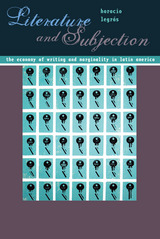
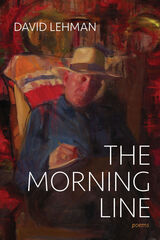
Lehman is a poetic ventriloquist, and he expertly imitates Catullus and François Villon in new poems and offers his fresh translations of Mayakovsky’s “Cloud in Trousers” and Hölderlin’s “Half-Life.” The element of joie de vivre in Lehman’s work is distinctive and unusual in contemporary poetry.

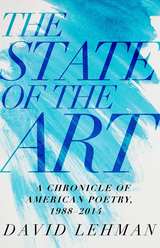

Ringer approaches womanhood from two directions: an examination of ways that women’s identities are tied to domestic spaces, like homes, cars, grocery stores, and daycare centers; and a consideration of physical, sexual, and political violence against women, both historically and in the present day. Lehmann’s poems look outward, and go beyond cataloguing trespasses against women by biting back against patriarchal systems of oppression, and against perpetrators of violence against women. Many poems in Ringer are ecopoetical, functioning in a “junk” or “sad” pastoral mode, inhabiting abandoned, forgotten, and sometimes impoverished landscapes of rural America.

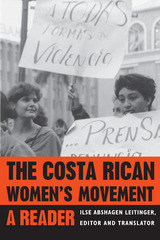
This reader reflects the genesis, scope, and direction of women’s activism in a single Latin American country. It collects the voices of forty-one diverse women who live in Costa Rica, some radical, others strongly conservative, and most ranging inbetween, as they write about their lives, their problems, their aspirations.
Unlike the comparative studies of women’s issues that look at several different countries, the reader provides an insider’s view of one small, but quintessentially Latin American, society. These women write of their own experience in organizing and working for change within the Costa Rican community. Some represent groups fitting into traditional “women’s movement” that wants to improve certain aspects of women’s and families’ daily lives. Still others, the “feminists,” argue forcefully that true improvement requires a profound change of power relations in society, of women’s access to power and decision making.
The articles are organized into thematic groups that range from the definitions of Feminism in Costa Rica to women in Costa Rican history, women’s legal equality, discrimination against women, and the status of Women’s Studies. The brief biographies that identify each author underscore the leadership of Costa Rican women in Latin American Feminism. The founders and editors of Mujer, one of the most influential Feminist journals in Latin America, are among the authors represented in the reader.
The audience for this book will include specialists interested in Latin America, in women in Latin America, and in the international women’s movement.

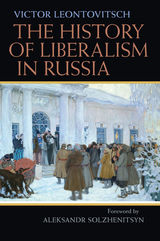
Foreword by Aleksandr Solzhenitsyn
The influence of liberalism in tsarist Russia is deeply problematic to most historians. In this highly original study, Victor Leontovitsch offers a reinterpretation of liberalism in a uniquely Russian form. He documents the struggles to develop civil society and individual liberties in imperial Russia up until their ultimate demise in the face of war, revolution, and the collapse of the old regime.
From Catherine the Great’s proposal of freedom for serfs born after a predetermined year, through the creation of zemstvos by Alexander II, and the emergence of the State Duma and a quasi-constitutional monarchy under Nicholas II, Leontovitsch chronicles the ebb and flow of liberal thought and action in the difficult circumstances of tsarist Russia. He cites numerous examples of debates over civil rights, property laws, emancipation, local jurisdiction, political rights, and constitutional proposals. Focusing on liberal reforms and reformers within the governing elite, Leontovitsch draws important distinctions between factions of radical (but fundamentally illiberal) progressives and true (but often concealed) liberalism.
This is the first English-language translation of Leontovitsch’s monumental work, which was originally published to critical acclaim in German in 1957. Aleksandr Solzhenitsyn sponsored a Russian edition in 1980, and his introduction is translated for the foreword of this edition. With a wide readership in today’s Russia, The History of Liberalism in Russia continues to resonate as a penetrating analysis of the historical precedents of liberal thought and its potential as a counterweight to current autocratic tendencies and the uncertainties of Russia’s political future.
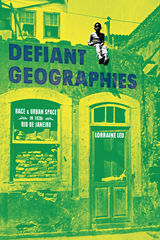
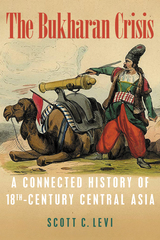
In its place, Scott Levi identifies multiple causal factors that underpinned the Bukharan crisis. Some of these were interrelated and some independent, some unfolded over long periods while others shocked the region more abruptly, but they all converged in the early eighteenth century to the detriment of the Bukharan Khanate and those dependent upon it. Levi applies an integrative framework of analysis that repositions Central Asia in recent scholarship on multiple themes in early modern Eurasian and world history
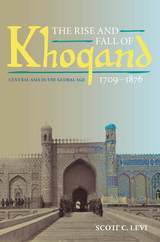
To demonstrate the major historical significance of this vibrant state and region, too often relegated to the periphery of early modern Eurasian history, Levi applies a “connected history” methodology showing in great detail how Central Asians actively influenced policies among their larger imperial neighbors—notably tsarist Russia and Qing China. This original study will appeal to a wide interdisciplinary audience, including scholars and students of Central Asian, Russian, Middle Eastern, Chinese, and world history, as well as the study of comparative empire and the history of globalization.
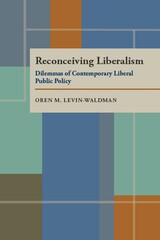
Levin-Waldman argues that if American public policy were to be evaluated against a different set of principles—ones more closely aligned with core liberal values, especially the common good—liberalism would be in greater harmony with contemporary public opinion and thought.
Liberalism rests on a moral vision of what constitutes the good life and a set of principles that can measure whether public policy accords with society's underlying philosophical principles. Levin-Waldman faults modern liberalism for obscuring these principles through a misplaced reliance on neutrality. Liberalism, he contends, appears to have diverged from mainstream perceptions of traditional American values because policy is debated and formulated within the confines of this neutrality standard.
Levin-Waldman develops a new methodology intended to take us away from the usual cost-benefit analysis and move us closer to assessing public policies in terms of what best serves the common good.
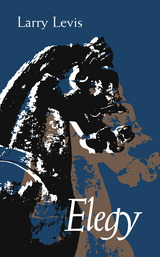
The poems were written in the six years following publication of his previous book, The Widening Spell of the Leaves, and continue and extend the jazz improvisations on themes that gave those poems their resonance. There are poems of sudden stops and threats from the wild: an opossum halts traffic and snaps at pedestrians in posh west Los Angeles; a migrant worker falls victim to the bites of two beautiful black widow spiders; horses starve during a Russian famine; a thief, sitting in the rigging of Columbus’s ship, contemplates his work in the New World. The collection culminates in the elegies written to a world in which culture fragments; in which the beasts of burden—the horses, the migrant workers—are worked toward death; a world in which "Love's an immigrant, it shows itself in its work. / It works for almost nothing"; a world in which "you were no longer permitted to know, / Or to decide for yourself, / Whether there was an angel inside you, or whether there wasn't."
Elegy, as Levine says, was "written by one of our essential poets at the very height of his powers. His early death is a staggering loss for our poetry, but what he left is a major achievement that will enrich our lives."



When Larry Levis died suddenly in 1996, Philip Levine wrote that he had years earlier recognized Levis as “the most gifted and determined young poet I have ever had the good fortune to have in one of my classes. . . . His early death is a staggering loss for our poetry, but what he left is a major achievement that will enrich our lives.” Each of his books was published to wide critical acclaim, and David St. John has collected together the best of his work from his first five books: Wrecking Crew (1972), Afterlife (1976), The Dollmaker’s Ghost (1981), Winter Stars (1985) and The Widening Spell of the Leaves (1991).
“It is not an exaggeration to say that the death of Larry Levis in 1996—of a heart attack at 49—sent a shock wave through the ranks of American poetry. Not only was Levis a good friend to many poets (not simply of his own generation but of many poets older and younger as well), his poetry had become a kind of touchstone for many of us, a source of special inspiration and awe. With Larry Levis’ death came the sense that an American original had been lost. . . . It is not at all paradoxical that he saw both the most intimate expressions of poetry and the grandest gestures of art, of language, as constituting individual acts of courage. One can only hope that, like such courage, Larry Levis’s remarkable poems will continue to live far into our literature.”—from the Afterword, by David St. John
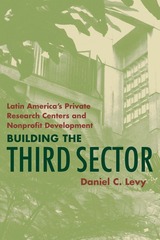
The private third sector has largely displaced public universities and bureaucracies as Latin America's leaders in social science and related policy activities. In many nations, these private research centers have become the main workplace for intellectuals. Mostly think tanks, they are influential political institutions, often making strong contribution to democratization.
The success of these research centers marks an unsurpassed triumph for international philanthropy, but it also raises questions about the proper role and structural home for research and advanced study. Levy shows how the centers' success often undermine a region's struggling universities while failing themselves to fulfill higher education's fundamental mission.
Levy deals broadly with regional developments, yet systematically identifies and analyzes the crucial subpatterns. He integrates impressive empirical data with conceptual perspectives on nonprofit organizations, comparative politics, and comparative education as well as Latin American studies.

Thaddeus “Thad” Mosley is a self-taught African American sculptor. Earning a living throughout his adult life as a postal worker in Pittsburgh, Pennsylvania, so that he could support his family by day and work as a sculptor by night, he has evolved an individual and powerful African American voice. He worked alone, patiently developing a sculptural language absolutely his own, yet traceable to his primary sources of inspiration, the vitality of African art and American jazz on the one hand, and on the other, two twentieth-century artists, the Romanian sculptor Constantin Brancusi and the Asian American sculptor Isamu Noguchi.
From the beginning Thad Mosley has been a carver. His materials have always been those “at hand,” logs from the trees of his native Western Pennsylvania, stones from the sites of demolished buildings in Pittsburgh, and metals from local scrapyards. Finding within each log or block of stone an essential vitality, his carvings invariably bear a syncopation of chisel marks evoking the rhythms and surging freedoms of jazz. Mosley’s perseverence and his pride in who he is offer an inspiring example of the unquenchable spirit of a true artists.
This short book introduces the life and work of this remarkable man. Davis Lewis, architect, writer, and painter, has been a friend of the artist for twenty-five years. His narrative is distilled from hours of taped interviews with Thad Mosley, as well as from a deep understanding of his art and influences. Lonnie Graham is a nationally known African-American photographer.
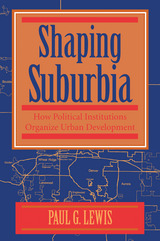
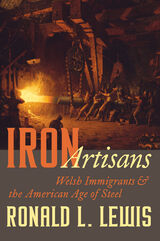

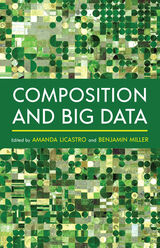
In a data-driven world, anything can be data. As the techniques and scale of data analysis advance, the need for a response from rhetoric and composition grows ever more pronounced. It is increasingly possible to examine thousands of documents and peer-review comments, labor-hours, and citation networks in composition courses and beyond. Composition and Big Data brings together a range of scholars, teachers, and administrators already working with big-data methods and datasets to kickstart a collective reckoning with the role that algorithmic and computational approaches can, or should, play in research and teaching in the field. Their work takes place in various contexts, including programmatic assessment, first-year pedagogy, stylistics, and learning transfer across the curriculum. From ethical reflections to database design, from corpus linguistics to quantitative autoethnography, these chapters implement and interpret the drive toward data in diverse ways.
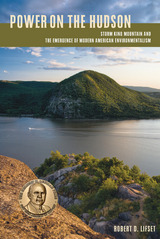
Robert D. Lifset offers an original case history of this monumental event in environmental history, when a small group of concerned local residents initiated a landmark case of ecology versus energy production. He follows the progress of this struggle, as Con Ed won approvals and permits early on, but later lost ground to environmentalists who were able to raise questions about the potential damage to the habitat of Hudson River striped bass.
Lifset uses the struggle over Storm King to examine how environmentalism changed during the 1960s and 1970s. He also views the financial challenges and increasingly frequent blackouts faced by Con Ed, along with the pressure to produce ever-larger quantities of energy.
As Lifset demonstrates, the environmental cause was greatly empowered by the fact that through this struggle, for the first time, environmentalists were able to gain access to the federal courts. The environmental cause was also greatly advanced by adopting scientific evidence of ecological change, combined with mounting public awareness of the environmental consequences of energy production and consumption. These became major factors supporting the case against Con Ed, spawning a range of new local, regional, and national environmental organizations and bequeathing to the Hudson River Valley a vigilant and intense environmental awareness. A new balance of power emerged, and energy companies would now be held to higher standards that protected the environment.
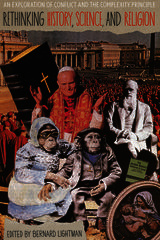
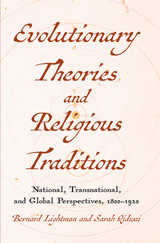
How Intellectuals and Global Publics Viewed the Relationship between Evolution and Diverse Religious Traditions
Before the advent of radio, conceptions of the relationship between science and religion circulated through periodicals, journals, and books, influencing the worldviews of intellectuals and a wider public. In this volume, historians of science and religion examine that relationship through diverse mediums, geographic contexts, and religious traditions. Spanning within and beyond Europe and North America, chapters emphasize underexamined regions—New Zealand, Australia, India, Argentina, Sri Lanka, Egypt, and the Ottoman Empire—and major religions of the world, including Christianity, Hinduism, Buddhism, Confucianism, and Islam; interactions between those traditions; as well as atheism, monism, and agnosticism. As they focus on evolution and human origins, contributors draw attention to European scientists other than Darwin who played a significant role in the dissemination of evolutionary ideas; for some, those ideas provided the key to understanding every aspect of human culture, including religion. They also highlight central figures in national contexts, many of whom were not scientists, who appropriated scientific theories for their own purposes. Taking a local, national, transnational, and global approach to the study of science and religion, this volume begins to capture the complexity of cultural engagement with evolution and religion in the long nineteenth century.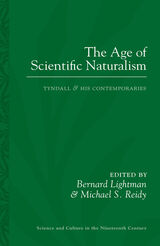
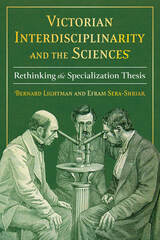
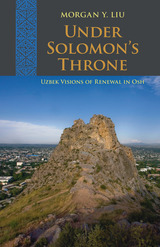
Winner of the 2014 Central Eurasian Studies Society Book Award in the Social Sciences.
Under Solomon’s Throne provides a rare ground-level analysis of post-Soviet Central Asia’s social and political paradoxes by focusing on an urban ethnic community: the Uzbeks in Osh, Kyrgyzstan, who have maintained visions of societal renewal throughout economic upheaval, political discrimination, and massive violence.
Morgan Liu illuminates many of the challenges facing Central Asia today by unpacking the predicament of Osh, a city whose experience captures key political and cultural issues of the region as a whole. Situated on the border of Uzbekistan and Kyrgyzstan—newly independent republics that have followed increasingly divergent paths to reform their states and economies—the city is subject to a Kyrgyz government, but the majority of its population are ethnic Uzbeks. Conflict between the two groups led to riots in 1990, and again in 2010, when thousands, mostly ethnic Uzbeks, were killed and nearly half a million more fled across the border into Uzbekistan. While these tragic outbreaks of violence highlight communal tensions amid long-term uncertainty, a close examination of community life in the two decades between reveals the way Osh Uzbeks have created a sense of stability and belonging for themselves while occupying a postcolonial no-man’s-land, tied to two nation-states but not fully accepted by either one.
The first ethnographic monograph based on extensive local-language fieldwork in a Central Asian city, this study examines the culturally specific ways that Osh Uzbeks are making sense of their post-Soviet dilemmas. These practices reveal deep connections with Soviet and Islamic sensibilities and with everyday acts of dwelling in urban neighborhoods. Osh Uzbeks engage the spaces of their city to shape their orientations relative to the wider world, postsocialist transformations, Islamic piety, moral personhood, and effective leadership. Living in the shadow of Solomon’s Throne, the city’s central mountain, they envision and attempt to build a just social order.

Phoenix is known as the “Valley of the Sun,” while Tucson is referred to as “The Old Pueblo.” These nicknames epitomize the difference in the public’s perception of each city. Phoenix continues to sprawl as one of America’s largest and fastest-growing cities. Tucson has witnessed a slower rate of growth, and has only one quarter of Phoenix’s population. This was not always the case. Prior to 1920, Tucson had a larger population. How did two cities, with such close physical proximity and similar natural environments develop so differently?
Desert Cities examines the environmental circumstances that led to the starkly divergent growth of these two cities. Michael Logan traces this significant imbalance to two main factors: water resources and cultural differences. Both cities began as agricultural communities. Phoenix had the advantage of a larger water supply, the Salt River, which has four and one half times the volume of Tucson’s Santa Cruz River. Because Phoenix had a larger river, it received federal assistance in the early twentieth century for the Salt River project, which provided water storage facilities. Tucson received no federal aid. Moreover, a significant cultural difference existed. Tucson, though it became a U.S. possession in 1853, always had a sizable Hispanic population. Phoenix was settled in the 1870s by Anglo pioneers who brought their visions of landscape development and commerce with them.
By examining the factors of watershed, culture, ethnicity, terrain, political favoritism, economic development, and history, Desert Cities offers a comprehensive evaluation that illuminates the causes of growth disparity in two major southwestern cities and provides a model for the study of bi-city resource competition.
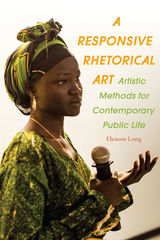
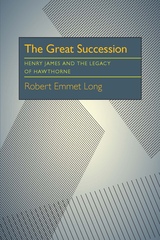
The first book devoted to the literary relationship between Henry James and his American predecessor, Nathaniel Hwthorne. Robert Emmet Long demonstrates James’ transformation of Hawthorne’s romantic forms into realism, as one of the significant features of James’ early career. Long shows that Hawthorne provided James ith a native tradition having its own conceptions of American psychological experience.
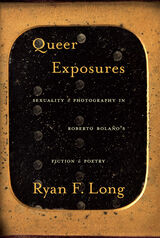
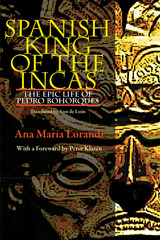
Described in his lifetime as “mad,” “a dreamer,” “quixotic,” and “a lunatic,” Pedro Bohorques is one of the most fascinating personalities of Spanish colonial America. A common man from an ordinary Andalusian family, he sought his fortune in the new world as a Renaissance adventurer.
Smitten with the idea of the mythical cities of gold, Bohorques led a series of expeditions into the jungles of Peru searching for the paradise of El Dorado. Having mastered the Quechua language of the countryside, he presented himself as a descendent of Inca royalty and quickly rose to power as a king among the Calchaquíes of Tucumán. He was later arrested and executed by the crown for his participation in a peasant revolt against Spanish rule.
In Spanish King of the Incas, Ana María Lorandi examines Bohorques as a character whose vision, triumphs, and struggles are a reflection of his seventeenth-century colonial world. In this thoroughly engaging ethnohistory, Lorandi brings to light the many political and cultural forces of the time. The status of the Inca high nobility changed dramatically after the Spanish conquest, as native populations were subjugated by the ruling class. Utopian ideals of new cities of riches such as El Dorado prevailed in the public imagination alongside a desire to restore an idealized historic past. As the Middle Ages gave way to the new belief systems of the Renaissance, ingenuousness about mythical creatures became strong, and personal success was measured by the performance of heroic deeds and the attainment of kingdoms. Charismatic and bold, Pedro Bohorques flourished in the ambiguous margins of this society full of transition and conflict.
Ann de León's artful translation preserves both the colorful details of the story and the clarity of expression in Lorandi's complex analyses.
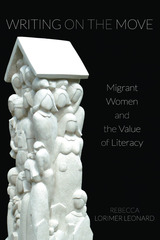
In this book, Rebecca Lorimer Leonard shows how multilingual migrant women both succeed and struggle in their writing contexts. Based on a qualitative study of everyday multilingual writers in the United States, she shows how migrants’ literacies are revalued because they move with writers among their different languages and around the world. Writing on the Move builds a theory of literate valuation, in which socioeconomic values shape how multilingual migrant writers do or do not move forward in their lives. The book details the complicated reality of multilingual literacy, which is lived at the nexus of prejudice, prestige, and power.
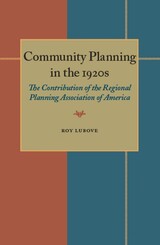
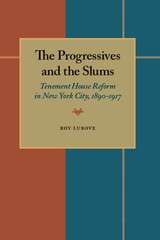
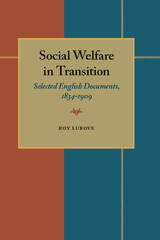
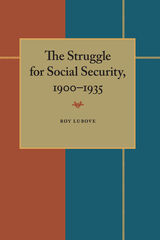
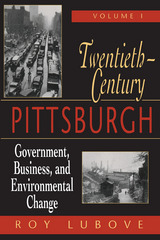
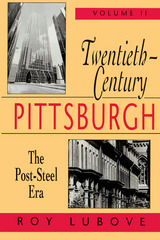
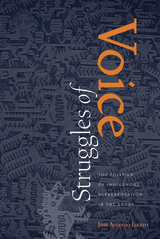
Building on extensive fieldwork, Lucero considers Ecuador's united indigenous movement and compares it to the more fragmented situation in Bolivia. He analyzes the mechanisms at work in political and social structures to explain the different outcomes in each case. Lucero assesses the intricacies of the many indigenous organizations and the influence of various NGOs to uncover how the conflicts within social movements, the shifting nature of indigenous identities, and the politics of transnationalism all contribute to the success or failure of political mobilization.
Blending philosophical inquiry with empirical analysis, Struggles of Voice is an informed and incisive comparative history of indigenous movements in these two Andean countries. It helps to redefine our understanding of the complex intersections of social movements and political representation.
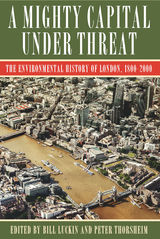
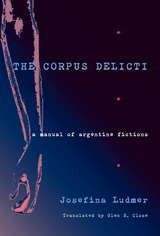
An intellectual tour de force from one of today’s leading critics of Latin American literature and culture, The Corpus Delicti (The Body of Crime) is a manual of crime, a compendium of crime tales, and an extended meditation on the central role of crime in literature, in life, and in the life of the nation.
Drawing her examples from canonical texts, popular novels, newspaper serials, and more, Josefina Ludmer captures the wide range of Argentine crime stories and detective fiction from the late nineteenth and early twentieth centuries. She offers more than a mere genre study, examining the relationship of crime and punishment to the formation of law, the body, and the modern state, exposing the ways in which literature—both high art and mass culture—can help construct, not just represent, social reality.
Covering a dazzling array of primary sources, social history, and cultural theory, this provocative work is also a structural masterpiece, challenging readers as it charts new roles for text and notes. In this redefined dialogue, the notes variously offer alternate views, additional insights, and, often, parallel commentaries. Glen Close’s stylish translation captures the energy of Ludmer’s prose—simultaneously subtle and daring—for English-language readers.
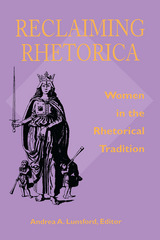
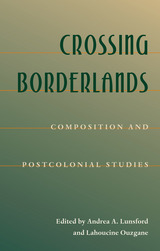
On the surface, postcolonial studies and composition studies appear to have little in common. However, they share a strikingly similar goal: to provide power to the words and actions of those who have been marginalized or oppressed. Postcolonial studies accomplishes this goal by opening a space for the voices of “others” in traditional views of history and literature. Composition studies strives to empower students by providing equal access to higher education and validation for their writing.
For two fields that have so much in common, very little dialogue exists between them. Crossing Borderlands attempts to establish such an exchange in the hopes of creating a productive “borderland” where they can work together to realize common goals.

Conventional wisdom holds that free trade is economically beneficial to nations. But this does not prevent industries and interest groups from lobbying their governments for protection, which creates a fear of electoral backlash among politicians hoping to promote free trade. The Limits of Protectionism demonstrates how governments can attain those economic benefits while avoiding the political costs.
Michael Lusztig’s theoretical model focuses on a process by which protectionists can be pushed to restructure and compete in a global economy. In this process, a small cutback in domestic protection leads to lost market shares at home; producers must then turn to overseas exports, and, as the size of foreign profits grow, former protectionists become active advocates for more and greater free trade opportunities.
In a wide-ranging array of case studies—from nineteenth-century Britain to Depression-era United States to contemporary New Zealand, Australia, Brazil, Canada, Chile, and Mexico—Lusztig reveals that, if skillfully handled, governments can eliminate the obstacles to free trade and enjoy continued economic growth without fear of protectionist groups seeking revenge at the ballot box.

There are few issues as politically explosive as the liberalization of trade, as recent controversies in the United States, Canada, and Mexico have shown. While loosening trade restrictions may make sense for a nation’s economy as a whole, it typically alienates powerful vested interests. Those interests can exact severe political costs for the government that enacts change. So why accept the risk?
Michael Lusztig contructs a model to determine why and under what conditions governments will take the free trade gamble. Lusztig uses his model to explain shifts to free trade in four cases: Britain’s repeal of the Corn Laws; the United States’ enactment of the Reciprocal Trade Agreements Act (1934); Canada’s decision to initiate continental free trade with the United States in 1985; and Mexico’s decision to pursue the North American Free Trade Agreement (NAFTA) in 1990.
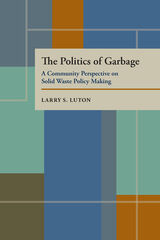

Threatened by issues of environmental health, climate change, population growth, and industrial demands, the coastal zone of the Great Lakes reflects an increasingly dysfunctional relationship between the people of the basin and the resources that support them. Perhaps no place is the physical manifestation of this struggle more evident than in the basin’s shallow bays. While many regional and local responses to these issues focus on methods of control, Five Bay Landscapes argues that responses should begin with critical, experiential, and pluralistic understandings of place. Through a series of five narratives, each located on a bay within the Great Lakes, the authors share their practice of curious site explorations. These explorations, both written and visual, consider the nuances and systems of these shorelines along with the lessons these findings might offer for future design and planning interventions. Using the Great Lakes as a context, Five Bay Landscapes illuminates a dynamic and robust landscape system and establishes a series of methods for understanding, analyzing, and intervening within the changing landscape.
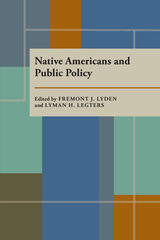
Native Americans, who are recognized simultaneously as sovereign tribal groups and as American citizens, present American society and its policy-making process with a problem fundamentally different from that posed by other ethnic minorities. In these essays, the contributors discuss the historical background, certain pathologies of Indian-white relations, questions of legal sovereignty and economic development, and efforts to find new ways of successfully resolving recent controversies.
Contributors: Gary C. Anders; Russel Lawrence Barsh; Guillermo Bartelt; Duane Champagne; Ward Churchill; Michael J. Evans; M. Annette Jaimes; Anne McCullogh; C. Patrick Morris; Nicholas C. Peroff; Kurt Russo; Dave Somers; Richard W. Stoffle; Ronald L. Trosper; Steven Zubalik; and the editors.
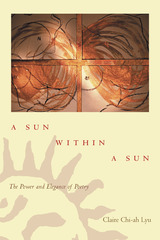
A Sun within a Sun is a sustained poetic reflection on the enterprise of poetry, on what poetry is and might be, not only for poet and theorist but also for reader, critic, teacher, and student. It sees poetry as life at its most genuine.
Using Baudelaire and Mallarmé as principal examples, but drawing on a wide range of poets and thinkers, from Greek mythology to Poe, Rimbaud, Rilke, and Blake; from Nietzsche, Gilles Deleuze, and Italo Calvino to William James and Henry Miller, Claire Chi-ah Lyu challenges contemporary poetic theory, using precise and acute deconstruction of poetic imagery to reconstruct language so that it celebrates both meaning and beauty.
<I>A Sun within a Sun</I> explores the notions of lightness and weight, discipline and indulgence, freedom and loss of will that are inherent in the poetic enterprise. It poses that lightness, discipline, freedom, and risk are essential for an approach to the enigma of beauty through an elegant shaping of form that holds true not only in poetry but also in pure science and even fashion. Poetry is a language within a language, a heightened and intense awareness of what words mean and what they can do, at its best creating an intensity of a sun within a sun. The poet and reader of poetry must take the risk Icarus took of approaching the sun, for without the risk there is no fulfillment.
A Sun within a Sun seeks a shaping of form and content that discovers poetry as power, as a practice of life that honors and makes possible both thought and feeling.
READERS
Browse our collection.
PUBLISHERS
See BiblioVault's publisher services.
STUDENT SERVICES
Files for college accessibility offices.
UChicago Accessibility Resources
home | accessibility | search | about | contact us
BiblioVault ® 2001 - 2024
The University of Chicago Press









